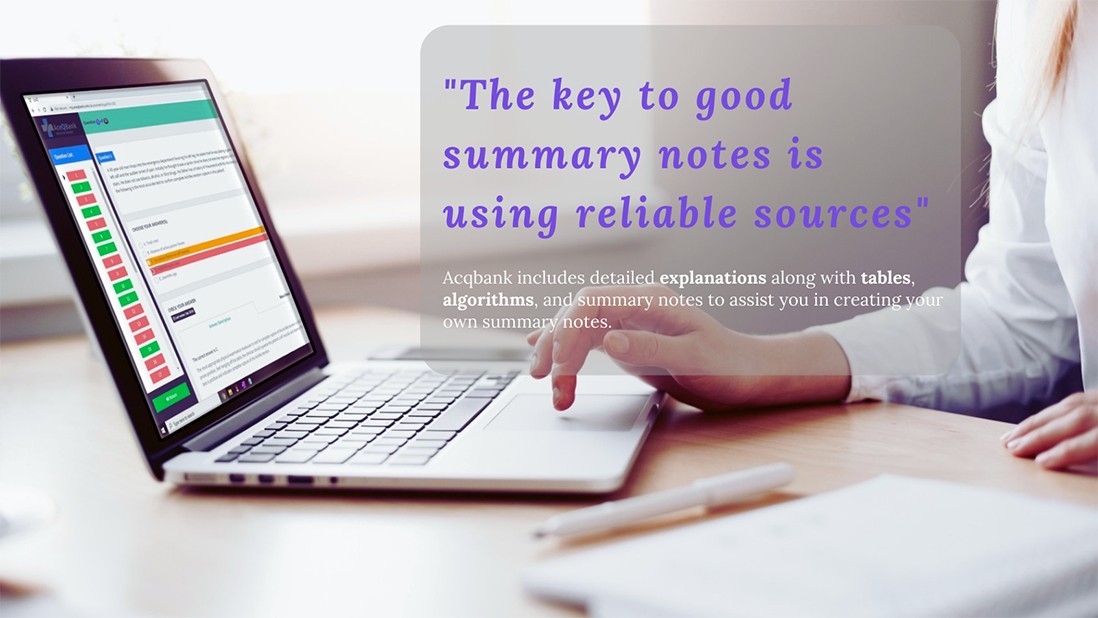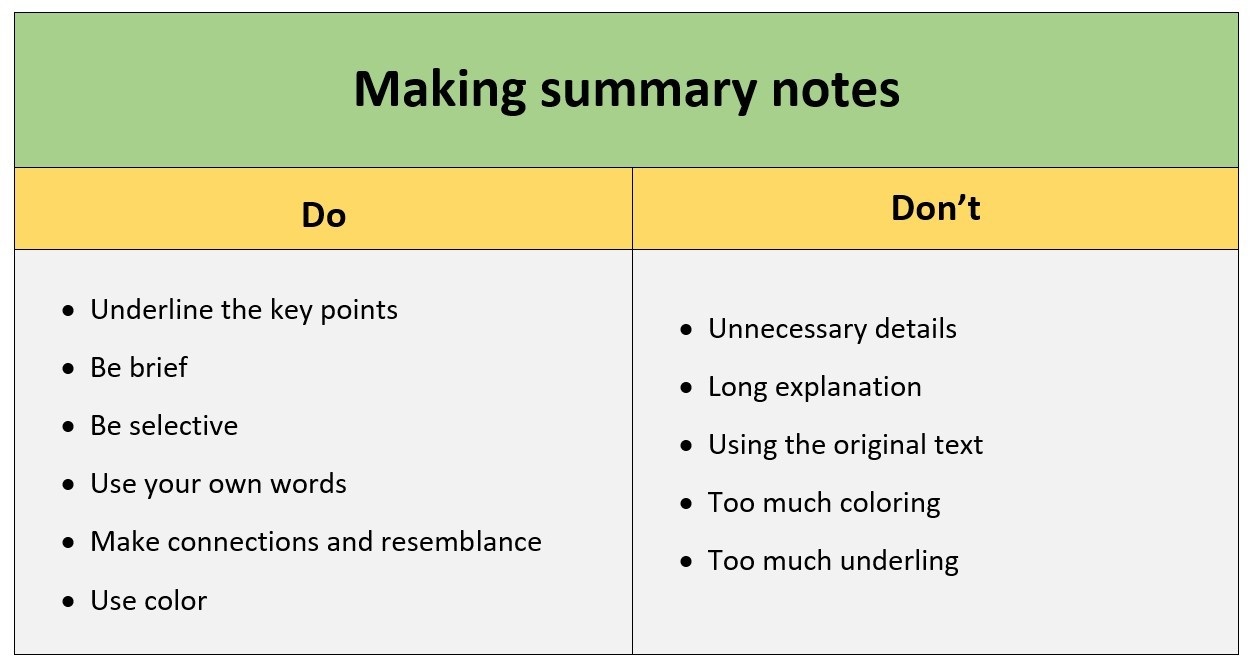MCCQE1 preparation – How to make effective summary notes

You need to cover a lot of Medical Council of Canada (MCC) objectives when preparing for the Medical Council of Canada Qualifying Examination (MCCQE) Part 1. Fear of remembering the key point is common during preparation for the MCCQE1 exam, which is a valid concern. Concise and well-organized summary notes will aid you in retaining the information you need to make a proper decision during the MCCQE1 exam and will address recall concerns.
Making notes is critical, especially when preparing for the MCCQE1 exam because good summary notes make the objective easier to recall and significantly improve performance simply by assisting you in recalling those key points, similarities, best initial test, and most accurate diagnosis, as well as best initial therapy and management during the exam.
Making summary notes involves actively engaging with the text’s ideas and transforming the original material idea into one’s own words through reflecting on key points or underlining key points. To summarize, you should be an active reader, and while reading, you should scan for key points with significant value, such as similarities between medical conditions, different and unique features of medical conditions. Next, take a moment to summarize what you’ve learned.
Note-making can be done in many ways, and different note-making methods exist, but Outlining, Mind-mapping, and Cornell methods are the most prominent and widely used methods. Some people prefer Cornell methods because Cornell is more appealing to them and is what works well for them, and some prefer a combination of methods, and they tend to combine Mind Mapping with Outlining. If you have successfully used one or more methods in the past, It is best to stick to the methods that have worked for you so far.
The purpose of this article is to discuss the advantages, disadvantages, and importance of making notes and why you should make your own summary note while studying for the MCCQE1 exam.
Why are summary notes important in MCCQE1?
To be effective, study must be active. When you note down a summary during your study, you actively engage your mind, which will help you understand and retain information better, which is essential during the preparation for the MCCQE1 exam.
A key part of creating summary notes is to understand the concepts well so that you can summarize them effectively. Making an effective summary note without a firm grasp of the concepts is not impossible but definitely less useful.
The concepts you’re learning are similar to the clothes in your closet: We have a tendency to keep clothing that we wear every day. The stuff that gets tossed or lost is the stuff that is piled in the back of the closet. Likewise, merely reviewing the same information over and over is useless. The key to retention is to do something with the content you wish to master. Making your own summary notes, as well as sketching figures or graphs, are common active learning techniques.
You have to do something with the content as you learn, such as generating your own summary notes to engages the hippocampus and amygdala. The hippocampus is a brain map that organizes information, allowing for broad comprehension as well as active memory. Amygdalas attach an emotional tag to events and knowledge, making them stand out among the sensory stream of daily experiences. When you interact with the information, your brain receives a signal that the content is significant and engages the mental processes that allow for long-term recall.
I’ve previously gone through the format of the MCCQE1 exam in-depth, but in a nutshell, the MCCQE1 exam consists of 210 multiple-choice questions (MCQ). The questions are not separated into sections and are meant to be answered one after the other. You will have around 3.5 – 4 hours in the morning to finish the exam. When you have to answer 210 questions in a row, having a strong memory comes in handy. Revising the summary note will provide you with a strong recall and an advantage over your competition.
How should I make a summary note?
To begin, you should first know the difference between taking notes and making notes. Note-taking and note-making are not the same. Note-taking is the act of jotting down notes from a lecture, conference, or meeting in order to relieve your mind of the burden of remembering everything and having a general idea of what was discussed, While Note Making is all about making personalized summary notes to describe what you have understood clearly from a textbook using your own words.
The ability to summarise is extremely valuable, especially in the medical sector, yet taking notes is not simple. However, in order to create a summary note, you must first comprehend the disease. Certain dermatological manifestations might be the result of gastrointestinal disease. Let’s go with erythema nodosum, which causes painful, red lumps on the shins. However, dermatological manifestations such as erythema nodosum are more common in Crohn’s disease patients but can also occur in ulcerative colitis patients.
In your summary points, you should include the key points in the history and physical examination findings that led to a proper diagnosis, as well as the difference between two similar inflammatory bowel diseases (Crohn’s disease and ulcerative colitis). The summary note should also include the appropriate management, therapy, medication side effects, and other clinical manifestations of inflammatory bowel disease. Time and patience are needed to collect all of this detailed information and write it down in your own words.
ACE Question Bank was created with you in mind. The correct, as well as incorrect answers, are explained for each question. In addition to explanations, Ace Qbank provides explanations as well as tables, algorithms, and summary notes to help you put together your own summary notes.
The essential point to remember is that an effective summary note is brief (one side of A4 MAX) but contains all of the necessary information without error, requiring you to return and double-check. Your notes might be tidy or sloppy in the form of organized lists or vast webs. As long as you can use them, it doesn’t matter. Here are a few suggestions for creating a good summary note:
- Should be short, selective, and contain all essential points
- Should be well-spaced for add more details later if necessary
- Should be the essence of your deep understanding of the concept
- Should be summarized using your own words
- Should be easy to memorize use color, highlighting, and underlining
You’ll know how good your notes are when you try to use them, so make sure your summary notes are error-free. They are clear, and you understand them, so there will be no surprise when you come to revise.
The characteristics of useless summary notes are as following:
- Close resemblance to the original source
- unsummarize (long summary note, two pages of A4)
- failure of writing it in your own words
Possibly you are wondering at this point whether the effort is worthwhile. Let me give you the answer……. Yes, absolutely. In medical practice, people use summary methods to claim success.
Benefits of making note
In terms of benefits, making notes can help you prepare for the MCCQE1 exam since they are a permanent record of concise and organized medical knowledge that you can access as you prepare for the exam. The following are some benefits of creating your own summary notes:
- helps you to understand, make connections, and remember
- Makes revision for the MCCQE1 exam much easier
- Helps you to focus on what is important, such as the best initial test, most accurate diagnosis, best initial therapy, and management.
- Helps you to identify the key points, similarities, major and minor differences between clinical presentations, which significantly increases the speed of answering questions.
Downside of making summary notes
Fortunately, there are few drawbacks to making summary notes. One big drawback is that if someone ignores the summary notes for a lengthy period of time and then attempts to go over them close to the exam date. Revision of summary notes will help solidify the information, but the reverse could have the opposite effect, which would exacerbate stress levels and cause chaos near the exam date. Here are a few disadvantages of making summary notes:
- Mistake in summary notes, pay attention when writing notes, and don’t rush to write down the summary. The accuracy of the information determines the summary note’s value.
- Poorly organized summary notes, poor arrangement of summary notes may lead to confusion that does not serve a purpose later.
- Too many summary notes, you should be selective when writing summary notes. Not everything is important.
- It takes time; Creating a well-organized summary will take time and effort, but it will be worth it in the end.
Take your time:
If you wish to make your notes an effective resource, then consider spending some additional time processing your notes while it’s still fresh in your mind; annotate, summarize, identify keywords and write down questions or the objective the notes address. Your notes won’t be of any value to you in the future if you merely file them and forget about them. Therefore, organizing your notes effectively now assures that they will be meaningful in weeks, months, or even years to come.
Review your summary notes:
The summary points need to be reviewed as often as possible, and It is critical to go over your summary points since this will help you retain what you learned. Every day, you should set aside time to revise your summary note, even if it is only a small part of the summary note. By reviewing, you strengthen your memory of key facts over time, which is tremendously helpful during the MCCQE1 exam.
No matter how good your summary notes are, they are useless without revision, and they will only create stress for you. The summary note from two months ago is no longer familiar today, which may cause you to cram before the MCCQE1 exam or may lead to feelings of unpreparedness, uncertainty, fear, and even postpone the exam if it spirals out of hand.
Need Help with Your MCCQE1 Exam Preparation?
Proper preparation is essential for success on the MCCQE1 exam, and you should make every effort to earn the maximum possible score on the MCCQE 1 exam. If you’re having trouble keeping to your study plan or if certain objectives are challenging for you, get the help you need to pass the MCCQE 1 exam on the first attempt.
Ace Qbank has got your back with over 1900+ high yield questions, many Clinical Decision-Making (CDM) cases, and several self-assessments are available to challenge and push you to your limit.
To facilitate preparation for the MCCQE1 exam, we developed the Ace Qbank based on the Medical Council of Canada (MCC) objectives. Our team reviews the question bank regularly based on current guidelines and recommendations, and we implement any changes we make as soon as possible to enhance your learning experience. Our objective is to keep the information up to date and in compliance with medical standards of care to avoid surprises during the test. At Ace Qbank, we’ve got you covered.
We invite you to sign up for your free version Ace Qbank demo today and see the difference that our elite question bank makes!





